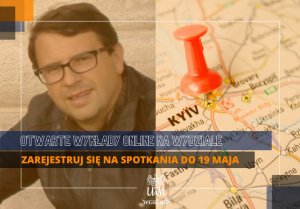W dniach od 26 maja do 23 czerwca 2023 r. prof. Kostyantyn Mezentsev (Taras Shevchenko National University of Kyiv) przeprowadzi na Wydziale Geografii Społeczno-Ekonomicznej i Gospodarki Przestrzennej Uniwersytetu im. Adama Mickiewicza w Poznaniu otwarte zdalne wykłady na temat "Post-socialist urban development". Wykłady adresowane są przede wszystkim do studentów studiów II stopnia oraz doktorantów, jednak do udziału zachęcamy wszystkie zainteresowane osoby.
Zarys tematyki wykładów:
Over the past 30 years, socio-spatial transformations have been continuing in post-socialist space due to institutional and socio-economic changes. Crucial transformations take place in cities with “multiple trends” and heterogeneous dynamics. Under socialism, everyday use of large ordinary cities’ public spaces by residents and their involvement in planning and arrangement was clearly hierarchical with contrasted ‘official’ spaces of power, ‘semi-official’ green spaces, and almost ‘unofficial’ local spaces. At the same time, this was conditioned by standardisation, which caused to some extent assimilation of the large ordinary cities and their public spaces. However, in many cases, highly standardised urban facades hided more diverse spaces behind reflecting individual and city-level specificity. Socialist-time mass housing neighbourhoods are undoubtedly in need for renewal. However, different approaches could be applied – from conservation to demolishing. Sometimes, the greyness of socialist-time housing estates is replaced by a colour palette when the facades are simply painted in different colours. This can be called 'rainbowfication' since such a 'rainbow'-effect does not always indicate higher status, better environment or new social infrastructure. During the last decade, suburban areas of the largest post-socialist cities are characterised by extremely dynamic transformations. They are becoming heterogeneous, fragmentary, polycentric. The most visible spatial expressions of transformation in Ukraine are suburban-absorbed rural settlements with high-rise housing, new “cottage” villages, residentialised summer houses settlements, and amplified Soviet era satellite towns. Global geopolitical confrontations manifest in individual cities and warfare is being urbanised. Urbicide as the deliberate destruction of the built environment targets not only urban heterogeneity and “otherness,” but rather the actual development of cities, growing civic consciousness, and public activism. Another side of the war impact on the city is mass displacement that could be understand through the lens of IDPs (non)-return narratives and local media frames. Principles of participatory urban planning have remarkably reshaped the set of interactions between actors of city development. The post-socialist cities are not exception. These changes are manifested through the introduction of new approaches and instruments, including those aimed at involving more stakeholders in the urban planning process, but also numerous conflicts due to ineffective, inexpedient and injustice city-planning decisions.
Program spotkań:
May 26 2023 (Friday)
11:30-13:00 CET Lecture 1. Post-socialist urban development – multiplicity of transformations (2 hours)
June 2 2023 (Friday)
11:00-12:30 CET Lecture 2. Socialist heritage in large ordinary cities (2 hours)
12:45-14:15 CET Consultation (2 hours)
June 7 2023 (Wednesday)
14:00-15:30 CET Lecture 3. Mass housing in post-socialist city: do-nothing, rainbowfication or renovation? (2 hours)
15:45-17:15 CET Consultation (2 hours)
June 9 2023 (Friday)
11:00-12:30 CET Lecture 4. Ambiguous suburban spaces (2 hours)
12:45-14:15 CET Consultation (2 hours)
June 14 2023 (Wednesday)
11:00-12:30 CET Lecture 5. Urbicide and post-war urban healing (2 hours)
14:00-15:30 CET Seminar/Workshop 1. From traumatised to wellbeing city (2 hours)
15:45-17:15 CET Consultation (2 hours)
June 16 2023 (Friday)
11:00-12:30 CET Lecture 6. Migration, displacement and the city (2 hours)
14:00-15:30 CET Seminar/Workshop 2. IDPs in the city (2 hours)
15:45-17:15 CET Consultations (2 hours)
June 23 2023 (Friday)
11:00-12:30 CET Lecture 7. Approaching participatory urban planning (2 hours)
14:00-15:30 CET Seminar/Workshop 3. Emotional mapping (2 hours)
